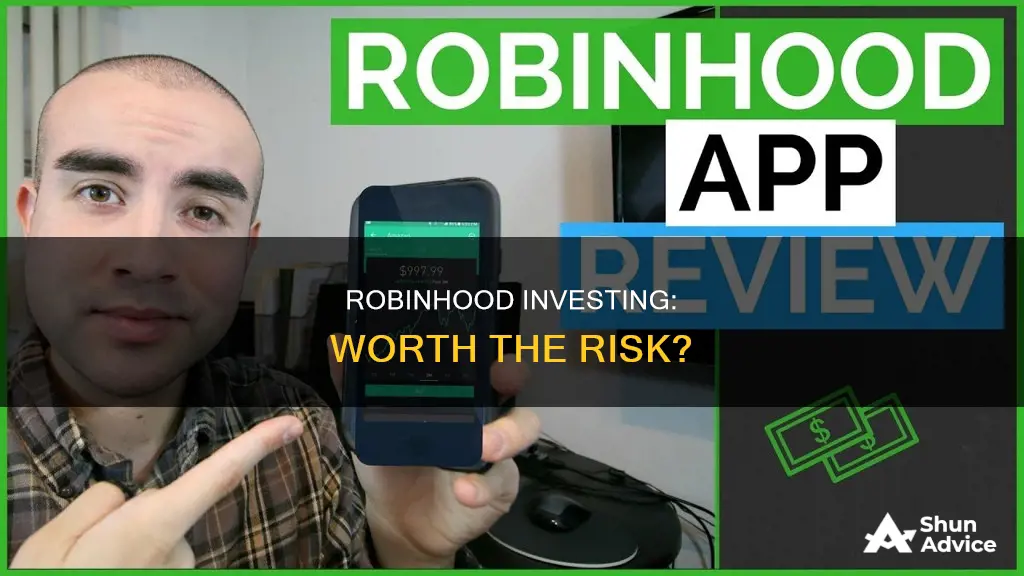
Robinhood is a popular trading app that has inspired other brokers to improve their offerings for novice investors. It is a legitimate and regulated broker, but it has some disadvantages compared to more established competitors. Robinhood offers commission-free trading of stocks, ETFs, options, and cryptocurrencies. It also provides a 1% match on IRA contributions, or a 3% match for Gold members. The app is best suited for intermediate or advanced investors who are less reliant on customer support and educational resources. While Robinhood has a simple and user-friendly interface, it lacks certain investment options such as mutual funds, fixed income, and foreign exchange. The app encourages active trading and margin trading, which may be high-risk for its target market of new investors. Overall, Robinhood is a good choice for those looking for an easy-to-use platform to trade stocks, ETFs, options, and cryptocurrencies, but it may not be suitable for those seeking a wider range of investment options or more advanced trading tools.
| Characteristics | Values |
|---|---|
| Commission fees | $0 for stocks, ETFs, options, and cryptocurrency trading |
| Account fees | $5 per month for Robinhood Gold |
| Instant brokerage-to-bank withdrawal fee | Minimum of $2 and a maximum of 1.75% of the amount withdrawn |
| Outgoing transfer fee | $100 |
| Instant deposits | Up to $1,000 |
| IRA match | 1% for regular customers and 3% for gold-level subscribers |
| Interest on uninvested cash | 0.01% for free accounts, 4.5% for Gold accounts |
| Investment choices | Crypto, listed stocks, options, exchange traded funds and some American Depository Receipts |
| Tools for active traders | Limited |
| Customer service | Limited |
What You'll Learn

Pros and cons of Robinhood
Pros of Robinhood:
Robinhood is a simple, low-cost brokerage with a few rare perks. It matches retirement deposits like an employer, the interface is gorgeous, and it's extremely affordable. Here are some of the benefits of using Robinhood:
- Robinhood is a true discount broker with some of the lowest costs in the industry.
- It offers commission-free stock, options, ETF, and cryptocurrency trades.
- It has a streamlined interface that is easy to use and navigate.
- It offers IRA with a 1% match (3% for Gold members).
- It offers a high-interest rate on uninvested cash.
- It offers 24-hour trading for some of the most active stocks.
- It offers access to Initial Public Offerings (IPOs).
- It offers fractional share trading.
- It offers high-interest cash options.
- It offers a 1% match on IRA deposits and 3% match on taxable deposits.
- It offers a debit card that provides cash back when you purchase participating brands.
- It offers instant deposits up to $1,000 while your ACH transfer is processing.
- It offers excellent educational resources for beginners.
- It offers a user-friendly mobile app.
Cons of Robinhood:
While Robinhood has grown in popularity, it is not the right platform for everyone. Here are some of the drawbacks of using Robinhood:
- Robinhood does not offer joint brokerage or custodial accounts.
- It does not offer bonds or mutual funds.
- It encourages active trading and margin trading, which are high-risk activities.
- It has limited tools for trading, research, and education.
- It has limited investment choices and does not offer mutual funds, fixed income, or foreign exchange.
- It has limited customer support and does not offer direct phone support or live chat.
- It has a poor rating from the Better Business Bureau due to customer complaints and regulatory actions.
- It has been fined by the SEC and FINRA for misleading customers and providing false or misleading information.
- It has been criticized for its heavy reliance on payment for order flow, which may result in worse prices for investors.
- It may not be suitable for advanced traders or investors who need more sophisticated tools and research.
Investing Cash During Inflation: Strategies for Success
You may want to see also

Investment options
Robinhood is a simple, low-cost brokerage with a few rare perks. It matches retirement deposits like an employer, the interface is gorgeous, and it's extremely affordable. No matter what or how you trade, Robinhood fees tend to match or beat the competition.
Robinhood lets you invest in the basics through standard accounts. You can purchase fractional shares of stocks and ETFs for as little as $1 on the platform. With the upcoming release of Robinhood's new trading interface "Robinhood Legend", you will be able to trade the S&P 500, oil, Bitcoin, and more.
Robinhood doesn't offer mutual funds and many types of alternative investments. For mutual funds, you're better off investing with a broker like Charles Schwab.
Robinhood gives you access to a debit card linked to your spending account. Robinhood Gold members can apply for access to the Robinhood Gold Card, a credit card that offers flat 3% cash back on spending in all categories.
Robinhood is one of the lowest-cost brokers around. What it lacks in account types, it makes up for in $0 commissions. It's one of the few brokers that charges $0 per-contract options fees. In the options trading universe, that's rare. Most brokers charge around $0.60 per contract.
Robinhood is a good fit for beginner investors, and the company made our list of the best brokers for beginners. The app offers a streamlined, approachable and easy-to-navigate trading platform, plus extremely low costs, which beginner investors tend to prioritize.
Robinhood is designed to provide easy access to the stock and crypto markets.
Investing Activities: Statement of Cash Flows Impact
You may want to see also

Fees and commissions
Robinhood pioneered the concept of commission-free trading, and this is one of its biggest selling points. There are no fees for trading stocks, options, ETFs, or cryptocurrencies. This is a huge advantage for new investors, as well as for those who trade frequently or with smaller amounts of money. The ability to enter and exit positions without incurring fees can make a big difference to your overall returns.
However, it's important to note that while Robinhood doesn't charge any explicit fees or commissions, there are some costs that users should be aware of. These include:
Regulatory Transaction Fees: In the US, the Financial Industry Regulatory Authority (FINRA) charges a small fee for selling stocks, ETFs, and options. This fee is typically a few cents per transaction and is standard across all brokerages, not just Robinhood.
Securities and Exchange Commission (SEC) Fee: This is another small regulatory fee, charged by the SEC for selling stocks, corporate bonds, and certain other securities. Again, this is a standard fee across the industry.
Trading Activity Fee: This fee is charged by the stock exchanges themselves for selling stocks. It is typically a fraction of a cent per share sold, with a minimum and maximum fee.
Options Contract Fees: While there is no commission for trading options on Robinhood, there is a fee charged by the Options Clearing Corporation (OCC) for each options contract you buy or sell. This fee is typically a few cents per contract.
Margin Interest: If you use Robinhood's margin trading feature to borrow money for investing, you will be charged interest on the borrowed amount. The interest rate depends on the amount of margin used and the base rate.
Transfer Fees: There may be fees associated with transferring your assets out of Robinhood to another brokerage, such as ACAT transfer fees. These fees can vary, so it's important to check the latest information on the Robinhood website or with their support team.
It's also worth noting that while Robinhood doesn't charge any currency exchange fees for trading cryptocurrencies, the spreads between buy and sell prices may be wider than on dedicated cryptocurrency exchanges, which can effectively increase the cost of trading.
So, while Robinhood does offer commission-free trading, there are still some costs and fees to be aware of. These are generally standard across the industry and are typically quite small, but it's important to understand all the potential costs involved before deciding to invest using Robinhood.
Cash App Investing Tab: What You Need to Know
You may want to see also

Customer service
Robinhood's customer support features text chat and phone support, although the latter is hard to reach. There is no displayed customer service phone number. Customers must be signed into their account to request a callback from Robinhood. While there’s a fairly robust FAQ support page that may be able to help answer your questions, the lack of easy direct customer support could cause heartburn for worried investors.
Robinhood's customer support is available 24/7, and the company has expanded its live phone support for options issues and account security. It has also introduced a smart triage flow and click-to-request callback technology to help customers pick the exact position they're having problems with, so it can find solutions as quickly as possible.
Robinhood's customer support team is available daily and operates around the clock for the majority of case types. The company has also more than tripled the size of its full-time customer support team and hired hundreds of new registered financial representatives to help customers with their account issues. It has also opened new offices in Tempe, AZ, Southlake, TX, and Denver, CO, and expanded its customer support team in Lake Mary, FL. Robinhood plans to more than double the number of full-time registered reps throughout 2021 and expand to new geographies to support this hiring goal.
Robinhood also offers self-service tools that help customers get answers to their questions without having to talk to someone. For example, it has added functionality that makes it easier to cancel a pending or queued deposit, exercise options, or deactivate an account without having to connect with a representative.
Robinhood also has an easily-navigable website and a library of hundreds of educational articles, as well as the "Investor's Guild" blog of expert commentary, plus a YouTube show.
Stash App: Investing Made Easy for Beginners
You may want to see also

Safety and security
Robinhood is considered a safe and secure platform for investors. It has never lost cash, stocks, or crypto through a cyberattack. It also has a range of security protocols in place to ensure the safety of its users' assets. Here are some of the measures Robinhood takes to protect its users:
- Insurance: Robinhood sweeps cash balances into F.D.I.C.-insured banks each day, insuring cash balances up to $250,000 per user. Stocks and ETFs on the platform are insured up to $500,000 through the Security Investors Protection Corporation (SIPC). While Robinhood's crypto offering is not covered by these policies, it does carry a separate policy to protect against cyberattacks.
- Penetration testing: Robinhood employs a team of white-hat hackers to constantly test its security measures and identify potential weaknesses.
- Password security: Robinhood uses the BCrypt hash function to hash all passwords, making it difficult for attackers to access passwords even if they penetrate the platform's defenses.
- Sensitive information: Robinhood encrypts sensitive information such as social security numbers and phone numbers before storing them. It also uses Transport Layer Security (TLS) to ensure that sensitive information sent by users cannot be intercepted by attackers.
- Two-factor authentication (2FA): Robinhood offers two-factor authentication as an additional layer of security. This requires users to input a code from their phone when logging in from a new device, even if the password is correct.
- Crypto withdrawals disabled by default: As crypto can be withdrawn to an anonymous, private wallet, Robinhood does not allow crypto withdrawals by default, reducing the risk of attacks.
In addition to these measures, Robinhood is a member of the Securities Investor Protection Corp. (SIPC) and is regulated by the Securities and Exchange Commission (SEC). It also maintains membership in the Financial Industry Regulatory Authority (FINRA), a self-regulatory organization that creates rules and regulations to protect investors. These regulatory protections provide further assurance of the safety and security of investing through Robinhood.
However, it is important to note that no platform is completely risk-free. Robinhood has faced data breaches and outages in the past, and there are some inherent risks associated with its sleek and minimal application, such as the limited investor tools available compared to other major brokerages. Therefore, while Robinhood takes extensive measures to protect its users, there are still some risks to be aware of when using the platform.
Using Debt to Leverage Investments: A Strategic Guide
You may want to see also
Frequently asked questions
Yes, Robinhood is good for beginners. It is frequently criticized for encouraging irresponsible investing, but it is still among the best trading platforms for beginners. The broker is user-friendly, with an intuitive interface and a simple, low-cost brokerage. It offers commission-free trading of stocks, ETFs, options, and cryptocurrency, and there is no minimum balance required to open or maintain an account.
Robinhood is not suitable for everyone. It does not offer mutual fund investing or free stock research reports. It also lacks deep account types, investment types, and customer service compared to more established brokers.
Yes, Robinhood facilitates cryptocurrency trading on its platform, with 15 different digital assets currently available, including Bitcoin, Ethereum, Dogecoin, and Litecoin.







